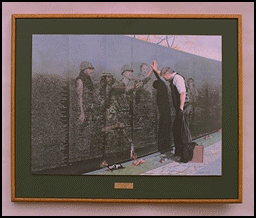Reflections in the Wall,
by: Jerry A.G. Ericsson
 From the moment I saw the painting "Reflections in the Wall" I knew that I had to travel to Washington DC and pay tribute to my comrades, lost in battle. The powerful picture, tastefully painted by the artist, Lee Teter depicts a veteran visiting the Vietnam Veterans War Memorial where he finds, deep within The Wall, the reflections of his fallen comrades.
From the moment I saw the painting "Reflections in the Wall" I knew that I had to travel to Washington DC and pay tribute to my comrades, lost in battle. The powerful picture, tastefully painted by the artist, Lee Teter depicts a veteran visiting the Vietnam Veterans War Memorial where he finds, deep within The Wall, the reflections of his fallen comrades.
My opportunity to visit The Wall came unexpectedly one day in 1989 when I received a call from a friend and fellow gun aficionado, (and local game warden) Gene Masse. He was being flown to Washington DC to help defeat the proposed semi-automatic ban. There was room for one more peace officer, and he thought of me. We were to fly to Washington, meet with our congressmen and tell them that we were against the ban. I quickly accepted, not only support the NRA, but also to visit The Wall.
The trip was uneventful until the landing at National Airport. As the plane circled the airport, I first saw The Wall. Its size was shocking even from that great distance.
The following day we went hurriedly about Washington, first to a meeting with the press, then to our local congressmen's offices. All the time, in the confines of my mind, the symbol of The Wall was lurking, haunting, distracting me from my mission. That evening, I decided to forego the formal farewell dinner with the NRA, and I boarded the subway for my trip to the Vietnam War Memorial.
As it came into view, the impact of its size struck me so long, so many names, so many lives lost. The shocking tragedy of their deaths in an ill-conceived, poorly-directed, unpopular war overwhelmed me. The other visitors blurred from view as The Wall became the center of my focus. I slowly walked down the entire length, stopping from time to time, reading the names, remembering, trying to make some sense of those times.
At last I came to the portion of The Wall that contained the names so familiar to me, the names of my lost comrades. Like the man in the picture, I reached out, touching the names, feeling the coolness of the stone in stark contrast to the stifling heat of the day. Vivid images of friends, lost so many years ago, came back to me. In my mind's eye I could see them, reaching back from the grave, touching my hand through The Wall, telling me it was over, telling me to go on with my life.
The noisy, rushing sounds of the city disappeared as I heard the quiet of the jungle: the birds calling to each other, telling of our approach; the hushed orders of the sergeant as he directed the patrol the squish of our boots alternately sinking in the muddy floor of the jungle, then freeing themselves for the next step; the rustle of our uniforms with each step; the should of the rain as it dripped from the trees above. Then I heard the sudden CRACK-CRACK-CRACK of the AK-47 rifles, the screams of agony of those hit by automatic fire, the orders shouted by our sergeant, the acrid smell of gunpowder stinging my nose, as we dove for cover, returning fire at the unseen enemy My best friend calling for me to help him as a medic worked feverishly over him, trying stop the blood which gushes from his wounds as each beat of his heart grew progressively weaker.
I again felt the slime of the mud as I crawled to him, grasping his hand, telling him he would be OK, telling him I was there, feeling his grip grow weaker as his body gave up his ghost. I again heard his final gasp as he died.
The sound of the radio crackles in my ears as I called in the artillery strike to kill the enemy to our front. The crashing of the rounds, exploding just yards in front of our position, still rings in my ears.
A lump welled in my throat, and I tasted the bitter tears that ran down my face as I bade farewell to my closest friends who fell in the ambush that day. The anger that I kept safely locked in the vault of my mind slipped from under the heavy door, hitting me like a sledge hammer. I was angry, angry at the people who sent them to a painful death in a war we were never allowed to win. The pain of loss returned gripping my heart like a vise. Slowly, the feelings changed as I realized they had not died in vain. They had died, as most soldiers do, fighting to protect their comrades who fought beside them. I could now think of my friends not as wasted lives in a useless war, but as heroes who gave their lives so the rest of the platoon could live.
The nightmares that had haunted my sleep for so many tears ended that day. The pain, the loss, and the anger disappeared. It was replaced by remembrance of the good times we enjoyed on R & R, the parties in the rear, the tales of home, the stories of fast cars and faster women happily shared over a beer. I could go on now with my life, comforted by the realization that my comrades, the heroes of the Vietnam War, will live on for all time in the hearts and minds of their countrymen, their names lovingly etched in the long, black wall.